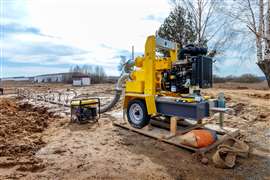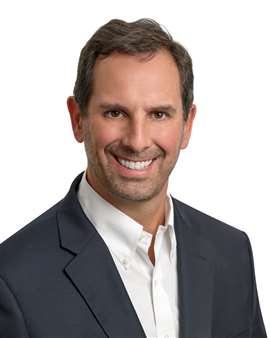Is now a good time for mergers and acquisitions in equipment rental?
25 October 2023
IRN’s Murray Pollok speaks to Joe Kondrup Jr, founder and CEO of Catalyst Strategic Advisors, the rental mergers and acquisitions specialist, about the current deal-making environment in the US, and the value that his business can bring to transactions.
There can’t be many people with more experience of mergers and acquisitions in the rental industry than Joe Kondrup Jr. He has worked on more than 200 transactions – half of these during his time as vice president of acquisitions for United Rentals when they started their roll-up of the US market in 1997, and the remainder with his Catalyst Strategic Advisors business, which he set up in 2007 to help steer rental companies through the M&A process.
 Joe Kondrup, Jr, founder and CEO of Catalyst Strategic Advisors. (Photo: Catalyst)
Joe Kondrup, Jr, founder and CEO of Catalyst Strategic Advisors. (Photo: Catalyst)
Catalyst works on deals valued anywhere from US$20-25 million to billions of dollar, including the $2.1 billion acquisition of Blueline Rental by United Rentals in 2018.
It will typically represent founder-owned rental businesses that are approached by a buyer or help an owner that wants to sell their business or seek capital injections.
Kondrup is located in Colorado Springs, Colorado, where a team of around five are based. Other senior staff include Jim Reddinger, COO and managing director, who has a financial background and is based in Denver, and Raffi Aharonian, the former Rouse Services executive who joined Catalyst earlier this year as a director, based in Los Angeles. IRN spoke to Kondrup and Aharonian by video call.
IRN: Do these smaller rental companies seek you out, or do you contact them?
Joe Kondrup: Both. We have a team of people, Raffi [Aharonian], Jim [Reddinger], me, and three other professionals that really do client relationship work to build relationships.
Our philosophy is to build a trust-based relationship with a client over a period of time. It could be months, could be years, so that when they are contemplating a really big decision, we’ve built enough trust, enough of a relationship where they’re comfortable working with us.
IRN: Can you describe the typical process?
Joe Kondrup: It depends on the size and sophistication of the company. Once we get hired, it typically takes three to six months to prepare an organised plan to bring them to market. That is an investment banker presentation that would include business history, financial information, fleet information, market dynamics, their competitive position of market, a full development of why that business is strategically and financially valuable.
So, we’ll have a three to six month prep period, and then we’ll have a four to six month transaction execution period. Often we’ll recommend attorneys or tax or audit advisors to collaborate in the process.
Raffi Aharonian: And leading up to that point of engagement, there might be a period of time measured in months and sometimes in years where we are interfacing with those prospective sellers, because we’re going to be able to provide them with good insights on what’s going on in the market, what people care about in terms of footprint, fleet age, fleet profile from a product and brand standpoint.
IRN: How would you characterise the M&A environment in rental now?
Joe Kondrup: From an M&A perspective and from an operating and growth perspective, it’s just very strong. I’ve been in the industry since 1997, when it was a $17 billion industry. Now it’s a multiple of that. The private equity has found the sector and invested heavily. The large majors continued to execute on growth strategies, both organic and inorganic through M&A. And that’s fueled by favourable economic conditions, GDP growth, infrastructure, repair and maintenance. So, the environment’s really good for us and our clients. There’s a universe of potential buyers and investors that are quite active.
 Catalyst was involved in the US$2.1 billion sale of BlueLine Rental to United Rentals in 2018.
Catalyst was involved in the US$2.1 billion sale of BlueLine Rental to United Rentals in 2018.
We know their criteria and their focus areas so that we can really target where to place and how to present our clients’ businesses to the broader industry. I forget the numbers, but if you look at last year, cumulatively for the major national players and the rest of the universe, there were well over a hundred transactions completed. And that doesn’t include the ones that are not published. So, it’s a very active, very strong environment.
IRN: Are supply chain issues playing into that? Using acquisitions to add fleet that they can’t otherwise get?
Raffi Aharonian: If you’re a seller or contemplating a sale, you’re in an environment that you haven’t seen before, where M&A activity and consolidation continues to be very active, the appetite from both strategic and financial buyers is quite high. And yet the supply chain has created this sort of disruption in terms of how the acquirers are able to get access to equipment.
So, equipment values are at some of the highest levels we’ve seen. If you’re looking to harvest the value out of your business now, it’s as good a time as any, because you’re seeing such demand for equipment in the marketplace. It’s created this interesting dynamic where not only as an acquirer are you getting into presumably a very good business in a market or a niche that you desire to be in, but you’re also solving part of the supply issue that you might’ve had in terms of gaining access to equipment.
IRN: And no signs of that slowing down? That seems to be the case in Europe’s economies.
Raffi Aharonian: We know that the US economy, relatively speaking, is stronger than the economies we have in Europe and in the UK, and we do read about a softening there, but we’re not seeing a change of behaviour in terms of mergers and acquisitions, not at all.
 Raffi Aharonian joined Catalyst as a director in 2023. (Photo: Catalyst)
Raffi Aharonian joined Catalyst as a director in 2023. (Photo: Catalyst)
Who knows if or when that will change. We have seen some of the equipment values come off of the peaks that we had seen in the last 12 months, but the reality is that those equipment values are still well above the normal historic run rate of where they’ve been. So, it continues to be an indicator of strong demand out there.
The other thing is that even though the supply chain has loosened up a bit, depending on which product or manufacturer you’re talking about, the lead times might still be between 12 and 18 months out. So, the issue hasn’t resolved itself altogether.
And, if you think about supply, it goes beyond just the notion of equipment. Because in order to operate a good rental business, not only do you need equipment, but you need good people and you need the physical branch locations as well.
And from an M&A standpoint, if you can bypass the road to greenfielding locations, which might dictate a longer lead time to opening up a new branch, you can get in and acquire a good business and get the branch footprint instantly, and you get, and in most cases, a retention of a lot of the staff that comes with that.
IRN: Why is there more involvement from private equity?
Joe Kondrup: The rental industry has evolved, grown, and the adoption rate of rental has consistently increased over the last two, three decades. I believe that the private equity world has discovered that rental is a very attractive investment option because the long-term performance of the industry, through various economic cycles, is well known.
And, you know, this is very fully documented through the public filings of the listed companies, the growth trajectory of the industry, the cashflow attributes, the capital intensity. In the early days of consolidation, the private equity model really hadn’t figured out how to manage the capital intensity and the cash flow generation industry, the characteristics of the rental industry. And over time it’s been well demonstrated that it’s very attractive, that returns are very attractive.
And the industry has developed and involved technologically so much that the ability to manage and measure performance, and really create a level of sophistication of professionalism, I think it just lends itself to private equity investment. We’re seeing a lot of interest from financial investors that want to be in the rental industry for the long term.
IRN: And private equity involvement bids up the acquisition prices of small companies, so it benefits the small company owner?
Joe Kondrup: It just depends on the transaction and the motivation and the interest level of the particular private equity shop. But in general, the bigger the universe of buyers, the more options our clients will have, the more options will stimulate more competition, which, creates support in valuation.
As Raffi pointed out, it’s not just buying fleet or buying revenue or buying cash flow, it’s people, it’s facilities, it’s connection to customers and markets. The more buyers, whether it’s strategic or financial, domestic or international, the better the environment is for our clients.
IRN: From the viewpoint of the small business owner, which is best, private equity or a major rental player?
Joe Kondrup: It’s just a very personal thing. Where one client is getting to the stage where they’re thinking about what’s next in their life, and then with their family, they may favour more of a strategic deal [with a rental buyer].
Younger entrepreneurs that have a lot of excitement and enthusiasm, they may favour private equity, because that gives them access to capital and some investment infrastructure to really grow their business.
Raffi Aharonian: We bring to the table all of the major rental buyers, but also a wide array of private equity and financial sponsor type buyers that, depending on the stage of life or the desires of the management team, that’s where we’re also going to be a really helpful partner for them.
The other thing is, being as embedded in the industry as we are - this is what we do day in and day out - we’re well tied in with all the strategics [major rental companies], so that when we pick up the phone and talk to them, they know what we’re bringing to the table.
IRN: The big rental firms are investing in specialty rentals and growing pretty remarkably. Is there a premium on the specialty rental businesses?
Joe Kondrup: The specialty sector’s been hot for a while. It continues to be a focus area of all acquirers, private equity, strategic buyers. Specialty creates a level of differentiation with the customer, whether that’s technical capabilities, design or whatever. It creates a more sticky relationship, creates differentiation for the provider. It’s been pump businesses, power generation, temperature control, trench shoring, lifting gear, etc. They are all very attractive and important verticals within the industry.
 Pump rental is an example of a specialist rental sector where acquisitions attract a premium. (Photo: AdobeStock)
Pump rental is an example of a specialist rental sector where acquisitions attract a premium. (Photo: AdobeStock)
IRN: EBITDA multiples has been the traditional way to value transactions. How has that evolved and where is it at the moment?
Joe Kondrup: That’s always a tricky one. EBITDA multiples get talked about a lot because it’s a good shorthand discussion about what a value might be. We find that the analysis is always significantly more complex than that. It’s really net free cash flow the business is going to generate, its margin profile, the age of its fleet, the markets it serves, the strength of the management team.
People throw around multiples all the time for general rental deals or specialty or aerial deals. And we certainly participate in that conversation from time to time, but we really try to dig deeper into our client’s businesses and tell them why a buyer can pay a value based on the cash flow and the profitability and the attributes of the business, both strategically and financially. But multiples and values are generally higher right now than they’ve been historically.
Raffi Aharonian: It is fair to say that specialty rental businesses tend to trade at premium EBITDA multiples to general rental businesses, and sometimes that premium can be quite significant.
IRN: The consolidation process has been going on for many years. There must be a stage when you begin to run out of businesses to acquire? Are we reaching that point?
Joe Kondrup: Not even close. Rental is still a local business. The market we go to, we see tremendous independent operators. Some of them have $10 million in fleet, some have $200 million fleet and everything in between. I was looking at a recent survey, I think by ARA, and there are several thousand, I think it was over 5,000, single to multi-branch operations.
So, no, I don’t think that we’re anywhere near run out of deal flow or deal capacity, but it certainly evolves in terms of where people focus and how the universe of acquirers focus on individual markets.
As long as we continue to see GDP growth, and as long as interest rates don’t get too much more, we don’t see too much more movement there. We’re very optimistic for years to come.
 Treching and shoring is a fast-growing rental market in the USA. (Photo: AdobeStock)
Treching and shoring is a fast-growing rental market in the USA. (Photo: AdobeStock)
As interest rates goes up, it takes cash flow to service the debt, and it affects values. We haven’t seen that effect yet. We’ve been watching it very closely. If interest rates hold where they are, maybe moderate over the next year or two, I think everything will continue to be very active. If interest rates increase significantly beyond where they are, who knows.
Raffi Aharonian: The last six months has been the highest interest rate environment we’ve seen in the last 10 years. Despite that, there’s two things that stand out that demonstrate the level of activity is still quite high. Number one, the volume of transactions continues to be as high as we’ve ever seen.
Number two, if we look at some of the deals - both deals that we’ve led or we’ve learned about - if you look in the specialty sector where the multiples are on the higher end, there’s regularly deals that we’re seeing trade at still high EBITDA multiples. And these are sizable businesses. So, the activity level and the valuations haven’t slowed down at all.
IRN: What kind of levels of consolidation do you expect to see in North America?
Joe Kondrup: You know, I think the major public rental companies publish their view of where their market position is and the overall addressable market, and what the unconsolidated segment of the market is. I think the top three players together still make up well under a majority of the industry.
So, in terms of consolidation, using the baseball analogy, we’re past the early innings. I don’t think we’re at the seventh inning. I can’t think of a good football analogy, but I think we’re somewhere before halftime.
The rental industry is $60 billion in the US today. It’ll be a hundred billion in five or 10 years, probably. There will be new entrants that emerge. The major players in the US and North America today will continue to be very powerful and very well-run businesses, but will there be others along the way and is there room for that? Absolutely.
 Jim Reddinger is Catalyst’s COO and managing director. (Photo: Catalyst)
Jim Reddinger is Catalyst’s COO and managing director. (Photo: Catalyst)
IRN: Do you get involved in international deals and what do you think are the aspirations of the big players in North America?
Joe Kondrup: We do spend some time internationally. There are a number of western European players that we maintain contact with that have expressed the desire to be here. We maintain a fairly high level of situational awareness going both directions, east to west, west to east, and there is always some activity there.
It’s a tighter filter because the span of control and cultural differences and currency and business practices and rental penetration is so different that the business in many respects are apples and oranges. If you look at plant hire in the UK and what is done here, there’s a ton of similarities, but there’s so many differences. We maintain relationships, but the investment decisions seem to be much more heavily or closely scrutinised.
IRN: What are some of the common things that go wrong in deals?
Joe Kondrup: The owners are experts in their business, but you don’t prepare your own taxes, you’re not your own cardiologist. When you’re going to sell your business for the one and only time in your life, you really can’t and shouldn’t go it alone. So, the mistakes are really not understanding the universe of buyers and how they perceive value, not preparing to optimise that value.
Raffi Aharonian: Creating a 360 degree view of the transaction and executing on it in a way that gets them the best value. There’s a lot of consolidation that takes place in the industry. Catalyst has been fortunate and has done the hard work to where we’ve been able to establish a really strong leadership position in that space.
As you know, in this rental industry relationships are a big deal, right? It’s a very relationship driven industry, and Catalyst brings those relationships to bear as part of the transactions..
Joe Kondrup: We’re equally capable and committed to serving clients that have businesses that have a value of $25 million to $250 million or half a billion dollars. And our experience and our knowledge base allows us to really understand the attributes of those businesses and present them in a way that drives superior value for our clients. We’re just as comfortable working on the $2.1 billion United Rentals BlueLine deal as we are working on the $25 or $50 million local rental deal.
IRN: Thanks to you both.
STAY CONNECTED



Receive the information you need when you need it through our world-leading magazines, newsletters and daily briefings.
CONNECT WITH THE TEAM








